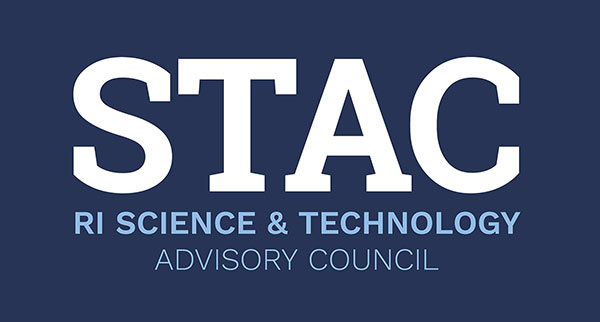With the goal to encourage entrepreneurship and new company creation by bringing technologies and discoveries into the marketplace, Governor Lincoln D. Chafee and the Rhode Island Science & Technology Advisory Council (STAC) today announced the recipients of the 2012 Rhode Island Research Alliance Collaborative Research Grants, the sixth round of awards aimed at facilitating collaborative research in Rhode Island. The awards totaling $1,419,271 will support eight projects, representing 20 scientists from 9 educational institutions, hospitals and companies throughout the state.

The grants provide seed funding to help Rhode Island scientists, businesses and research institutions work together to advance ideas that can eventually create new products, companies and quality jobs in the state while growing our innovation- and technology-driven industries. Following the announcement, three academic-industry collaborations that received grants last year reported on their progress.
To date, STAC investments in collaborative research have yielded a return of nearly $36 million back to the state in the form of grants for continued research, new equipment, commercialization of new products and venture funding for new companies.

The 2012 award recipients include academic and industry scientists pursuing research in aquaculture diseases, climate change, chronic wound healing and other areas of cutting-edge exploration. Winning teams include scientists from the University of Rhode Island, Brown University, Rhode Island College, Roger Williams University, Salve Regina University, Rhode Island Hospital, Narragansett Bay Estuary Program and two private companies.
More about the 2012 Collaborative Research Grants Awardees:
New Tools and Mechanisms to Combat Aquaculture Diseases
Description:
The overall goal of the project is to develop new tools to promote animal health in aqauculture by building on recent discoveries of marine bacteria that demonstrate impressive protective properties against disease.
Objective:
To develop new commercial products to promote fitness and prevent disease for finfish and shellfish in aquaculture facilities.
Collaborators:
David Rowley, David Nelson and Marta Gomez-Chiarri, University of Rhode Island�?�
Dale Leavitt and Roxanna Smolowitz, Roger Williams University
Revealing Active Responses of the Ocean State’s Marshes to Climate Change with Biogeochemistry & Environmental Genomics
Description:
The project will study if changing environmental conditions due to human activities are changing the ability of salt marshes to store carbon at the highest rates per area of any ecosystem.
Objective:
To determine whether marshes are net “sinks” or “sources” of gasses and train undergraduates and one high school teacher.
Collaborators:
Serena Moseman-Valtierra, University of Rhode Island
Breea Govenar, Rhode Island College
Understanding Coastal Environmental Change, Past, Present and Future: A Novel Approach Combining Algal Physiology, Genetics and Lipid Biomarkers
Description:
The project will study an important class of organic biomarker produced by algae that are thought to record past sea surface temperatures to produce a marine-based, local climate history of Narragansett Bay against which future patterns and rates of modern global change can be compared.
Objective:
To use this information to better understand future environmental change at our nation’s coastlines.
Collaborators:
Timothy Herbert and Linda Amaral-Zettler, Brown University�?�
Tatiana Rynearson, University of Rhode Island
Lab-on-Paper Technology for Immunodiagnostics
Description:
An academic-industry collaboration to accelerate development of an enzyme based diagnostic device on paper that will improve on existing technology.
Objective:
To produce new point-of-care immunodiagnostic devices that perform multi-step tests that are easier to read and can be used by a wider patient population.
Collaborators:
Mohammad Faghri, University of Rhode Island�?�
Constantine Anagnostopoulos, Labonachip, LLC
Climate-Driven Impacts on the Formation and Persistence of Macroalgal Blooms: Bringing UlvaBloom Biology into the Genomics Era
Description:
This project will assess the econological and genomic aspects of the formation of harmful macroalgal blooms in response to climate change in Narragansett Bay.
Objective:
To use data to predict and monitor harmful blooms.
Collaborators:
Carol Thornber, University of Rhode Island�?�
J.D. Swanson, Salve Regina University
Enhancement of Chronic Wound Healing with Non-invasive Local Skin Vibratory Stimulation
Description:
The project will test the effectiveness of a medical device that uses mechanical vibratory stimulation to increase blood flow and tissue oxygenation to improve wound healing and decrease the pain and suffering of burn patients.
Objective:
To demonstrate proof of principal of the effectiveness of vibratory stimulation on wound healing.
Collaborators:
John Reichner, Rhode Island Hospital�?�
Shai Schubert, Perfuzia Medical Inc.
Characterization of Novel Anaerobic Nitrogen-Fixing Bacteria Isolated from Narragansett Bay Sediments that Respond to Human-Induced Climate Change
Description:
The project will determine the environmental factors that control Nitrogen fixation within the sediments of Narragansett Bay and predict how microbial activity in bay sediments will respond to future environmental impacts.
Objective:
To use this knowledge to better understand Nitrogen cycles in the Bay and thus improve water quality practices.
Collaborators:
Bethany Jenkins, University of Rhode Island
Chris Deacutis, Narragansett Bay Estuary Program
Graphene-Polymer Composite Materials
Description:
The goal of this project it to improve practical use of graphene, a recently discovered, essentially 2-dimentional material with unprecedented tensile strength, electrical and thermal conductivity, optical transparency and gas impermeability.
Objective:
To develop a uniquely functional graphene-polymer composites that will lead to commercial opportunities and establish Rhode Island as a leader in this field.
Collaborators:
Robert Hurt, Brown University�?�
Arijit Bose, University of Rhode Island
